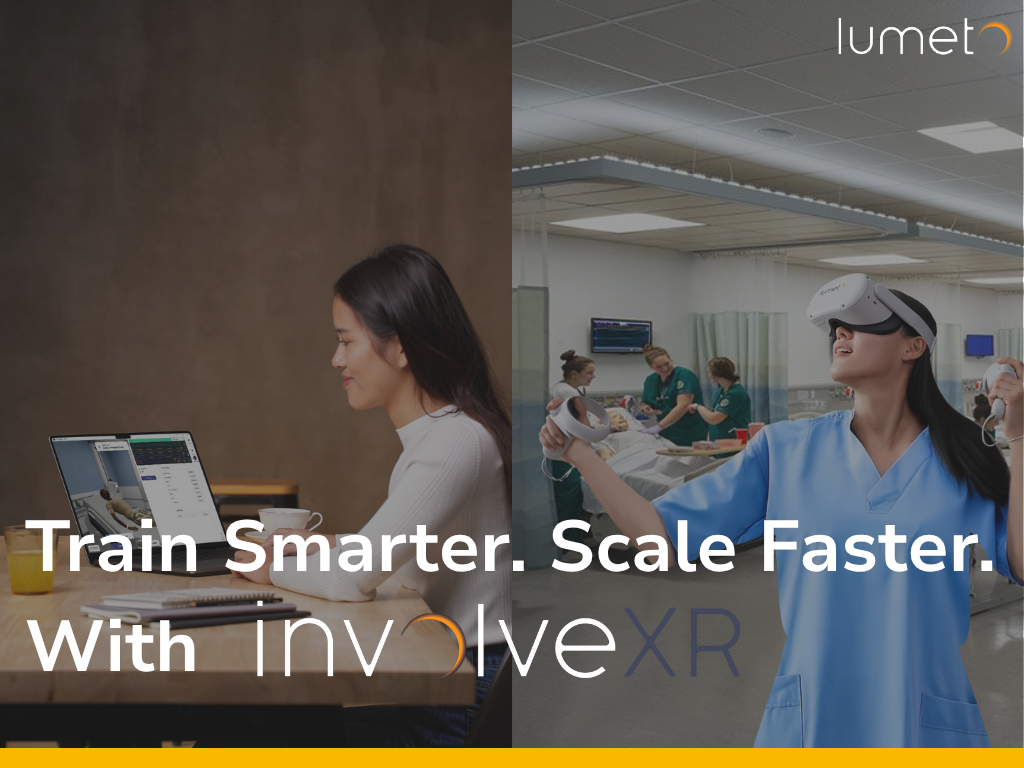
What Happens When You Compare Standardized Patients to AI-Driven VR Simulation?
In our latest CE-accredited webinar with HealthySimulation.com, Dr. Nicole Harder of the University of Manitoba joined Lumeto’s Shruti Natarajan to explore the results of a groundbreaking study: a direct comparison between standardized patients (SPs) and AI-enhanced virtual patients powered by our InvolveXR platform.
This wasn’t a hypothetical debate. It was a real-world, study involving 240 undergraduate nursing students, half using traditional SPs, and half working with fully AI-powered virtual characters in a controlled clinical communication scenario.
Here’s what we learned and how we’re evolving InvolveXR based on the findings.
A Research-Backed Look at AI in Healthcare Simulation
The University of Manitoba’s study set out to explore:
- How learners perceive the realism of AI-VR vs. SPs
- The role of psychological safety in simulation
- The impact on communication skill development and confidence
Both modalities provided strong learning outcomes but served learners in different ways.
What learners found:
- SPs were effective for building nuanced communication and emotional connection
- AI-VR offered a consistent, low-pressure environment that encouraged exploration
- Many learners preferred starting in VR before progressing to SPs, citing reduced anxiety and increased willingness to engage
Turning Feedback into Features: How We’ve Already Improved
The study surfaced two clear areas for growth:
- AI voices lacked emotional realism
- VR headsets aren’t always accessible
At Lumeto, we believe feedback is fuel for innovation. That’s why we’ve already addressed both.
All-New AI Voices
Our newly launched AI voice system delivers:
- Expressive tone, emotion, and natural cadence
- Human-like dialogue that improves learner engagement
- Greater realism across every scenario
InvolveXR On Screen
InvolveXR is no longer limited to VR headsets, now it’s accessible from your laptop.
InvolveXR On Screen brings the same AI-enabled virtual patients, clinical realism, and immersive training to a more flexible and accessible format.
- Perform patient assessments, therapeutic communication, and documentation
- Ideal for pre-simulation, remediation, hybrid learning, or asynchronous education
- No hardware required—accessible from any browser
- Fully customizable to match your curriculum and learner level
This isn’t a stripped-down experience. It’s the same powerhouse simulation, just on screen.
One platform. Two modalities.

From Research to Real Impact
This study reinforces what many simulation leaders already suspected: SPs and AI-VR work best when used together.
AI-VR enables low-risk, iterative practice, now with a level of emotional realism that rivals traditional methods. Thanks to enhanced AI voices and expressive patient behavior, InvolveXR creates emotionally engaging encounters that help learners build clinical confidence, therapeutic communication, and empathy, all in a flexible, scalable format. When blended strategically, SPs and AI-VR create a scaffolded learning model that builds confidence, communication skills, and clinical reasoning.
The implications for educators are significant:
- Substantial cost savings: As Dr. Harder shared during the webinar, the cost of implementing InvolveXR was comparable to the annual warranty for a single high-fidelity manikin—making immersive simulation dramatically more accessible for programs of all sizes.
- Lower cost per learner: With scalable licensing and flexible deployment, InvolveXR stretches simulation budgets further than traditional methods.
- Consistent delivery of learning objectives: Standardized experiences eliminate variability and support structured outcomes.
- Remote, rural, and hybrid integration: Bring immersive simulation to any setting, no travel or SP coordination needed.
- Faculty efficiency: Use AI to assist in assessment, feedback, and training delivery—freeing up valuable educator time.
Educators no longer have to choose between scalability, realism, and affordability. With InvolveXR, you can have all three.

🎥 Watch the Full Webinar Recording
Explore the full conversation between Dr. Nicole Harder and Shruti Natarajan, including key insights on integrating AI into simulation, student reactions, and next steps for curriculum development.
Ready to Reimagine Clinical Training?
InvolveXR offers more than just immersive VR—it delivers adaptable, evidence-based, AI-powered simulation that meets learners where they are.
Whether you’re building empathy, critical thinking, or confidence in clinical decision-making, we’re here to help you scale it.
Let’s shape the future of healthcare education together.
